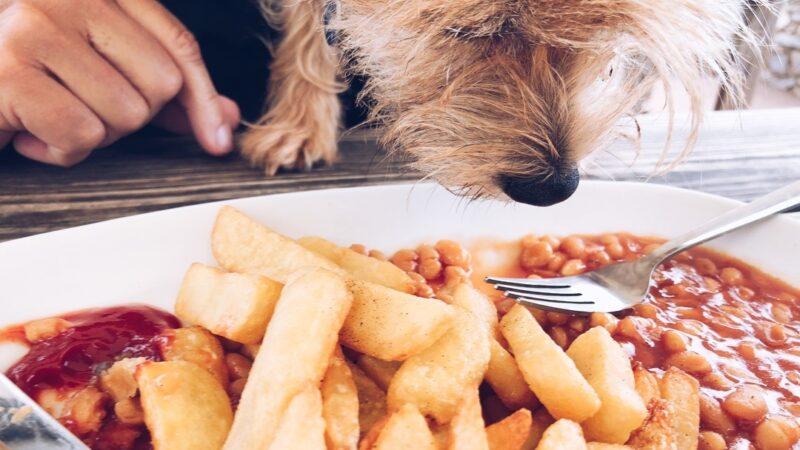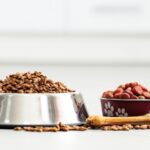As a dedicated dog owner, you’re always on the lookout for tasty treats to share with your furry friend. When you whip up a batch of baked beans, you might find yourself wondering: Can dogs eat baked beans?
No, dogs cant eat baked beans, because they often include some toxic ingredients to them like onions, sweets and sodium.
Common Ingredients in Baked Beans:
- Beans: Usually navy, pinto, or kidney beans.
- Tomato-based Sauce: Provides moisture and flavor.
- Sweeteners: Molasses, brown sugar, or maple syrup.
- Spices: Such as mustard, paprika, and black pepper.
- Additives: Onions, garlic, bacon, or other meats.
While baked beans are nutritious for humans, the question remains: Are these ingredients safe and beneficial for dogs?
5 Health Risks of Baked Beans for Dogs
While baked beans might be a popular comfort food for humans, they are not a good option for dogs. In fact, baked beans can pose several health risks to your furry friend. Here’s why you should avoid feeding baked beans to your dog:
High in Unhealthy Fats
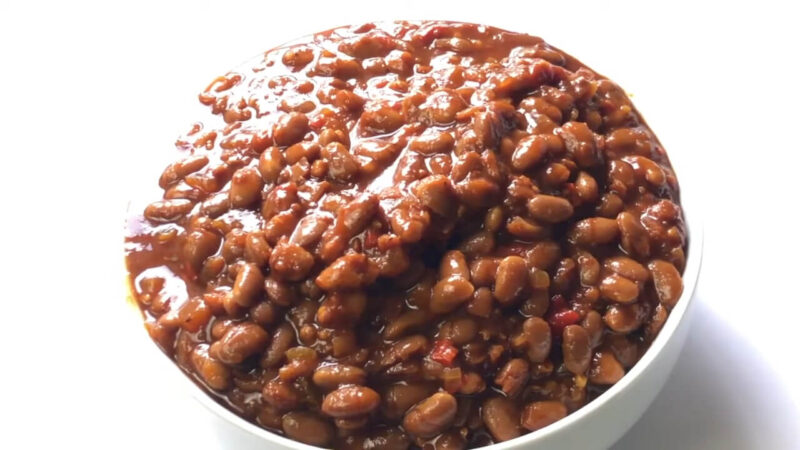
Baked beans contain high levels of saturated fats, which dogs are not equipped to digest in large amounts. Fatty foods can lead to digestive issues like bloating, gas, and upset stomach in dogs.
More seriously, prolonged exposure to high-fat foods increases the risk of developing heart disease or pancreatitis, a painful inflammation of the pancreas that can be life-threatening if left untreated.
Calorie-Dense, Leading to Weight Gain
Packed with calories, baked beans can contribute to rapid and unhealthy weight gain if dogs are fed large portions. Dogs don’t need high-calorie foods like humans, and overfeeding them high-energy foods like baked beans can increase the risk of obesity.
Obesity in dogs is linked to various chronic conditions, including joint problems, diabetes, and even a shorter lifespan.
Loaded with Sodium
The high sodium content in canned baked beans is dangerous for dogs. Dogs have a much lower tolerance for salt than humans do. Excessive salt can cause dehydration and in severe cases, sodium ion poisoning, also known as salt poisoning.
Symptoms include excessive thirst, vomiting, diarrhea, loss of appetite, and lethargy. Long-term exposure to high salt levels can lead to kidney damage and increase the risk of heart disease.
High in Sugar and Risky Sweeteners
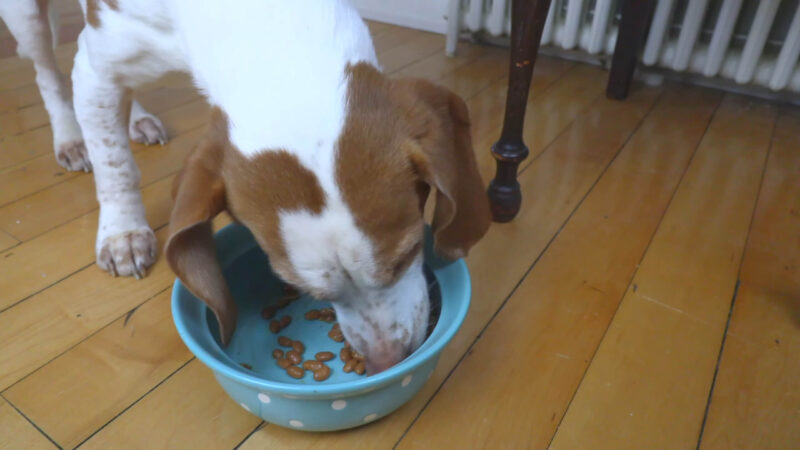
Baked beans are often loaded with sugar, which can upset your dog’s blood sugar levels, contributing to the development of obesity and diabetes over time.
Even more concerning is the potential presence of artificial sweeteners like xylitol in some baked beans. Xylitol is highly toxic to dogs, even in small amounts, and can lead to life-threatening hypoglycemia (low blood sugar) and liver failure.
Contains Toxic Ingredients
Many recipes for baked beans include seasonings and additives that are harmful to dogs. Ingredients like garlic powder, onion powder, and tomato sauce are commonly used in baked beans, but they are toxic to dogs.
Even small amounts can cause gastrointestinal distress, including vomiting, diarrhea, and in severe cases, anemia (especially with garlic and onions). The cumulative effect of these toxic substances can severely harm your dog’s health.
Safer Bean Options for Dogs
Although baked beans are unsafe, dogs can benefit from other types of beans as part of their diet. Cooked, plain beans—without added seasonings, salt, or sugar—can provide your dog with fiber and protein. Some dog-friendly beans include:
-
Lima Beans (Butter Beans)

Lima beans are rich in fiber, which helps support your dog’s digestive system and can prevent constipation. They also contain plant-based protein, helping with muscle maintenance and energy.
Lima beans are a good source of iron and potassium, which support healthy blood circulation and heart function.
-
Garbanzo Beans (Chickpeas)
Chickpeas are high in protein and fiber, making them an excellent choice for boosting your dog’s energy levels and keeping them full for longer.
They also contain essential vitamins and minerals like folate, manganese, and iron, which contribute to healthy cell function and overall metabolism.
-
Green Beans
Green beans are low in calories and high in fiber, making them a great snack for dogs prone to weight gain. They also provide vitamins A, C, and K, which help support your dog’s immune system, improve skin and coat health, and promote bone health.
The crunchy texture also makes them a good treat to satisfy your dog’s chewing instincts.
-
Kidney Beans
Kidney beans are packed with antioxidants, which help fight free radicals in your dog’s body and support overall cellular health. They are also high in fiber and protein, aiding digestion and promoting lean muscle mass.
However, kidney beans must be fully cooked, as raw or undercooked kidney beans contain lectins, which can be toxic to dogs.
-
Lentils
Lentils are an excellent source of plant-based protein and fiber. They are also rich in iron, potassium, and folate, which contribute to healthy heart function, strong muscles, and improved metabolism.
Lentils are low in fat and calories, making them a great option for dogs who need to maintain or lose weight.
-
Black Beans
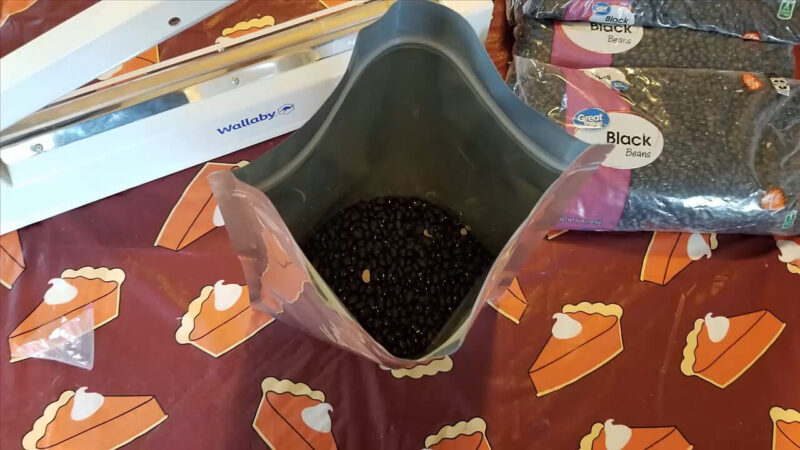
Black beans are full of nutrients like vitamin C, vitamin K, and manganese. They help promote a healthy immune system, improve bone strength, and aid digestion due to their high fiber content.
Black beans also provide a steady energy source thanks to their protein and carbohydrate combination.
-
Pinto Beans
Pinto beans are high in fiber and contain beneficial antioxidants. These beans help regulate blood sugar levels, making them particularly helpful for dogs with diabetes or those at risk.
They are also rich in magnesium, which supports muscle function and heart health.
-
Navy Beans
Navy beans are another fiber-rich option that promotes healthy digestion. They are high in protein and low in fat, making them ideal for weight management. Navy beans are also a good source of B vitamins, which aid in energy production and maintaining a healthy metabolism.
-
Soybeans
Soybeans are a great source of complete protein, containing all the essential amino acids that dogs need for muscle growth and repair. They are also rich in omega-3 fatty acids, which help improve skin health and maintain a shiny coat.
Soybeans also provide calcium, supporting strong bones and teeth.
-
Edamame
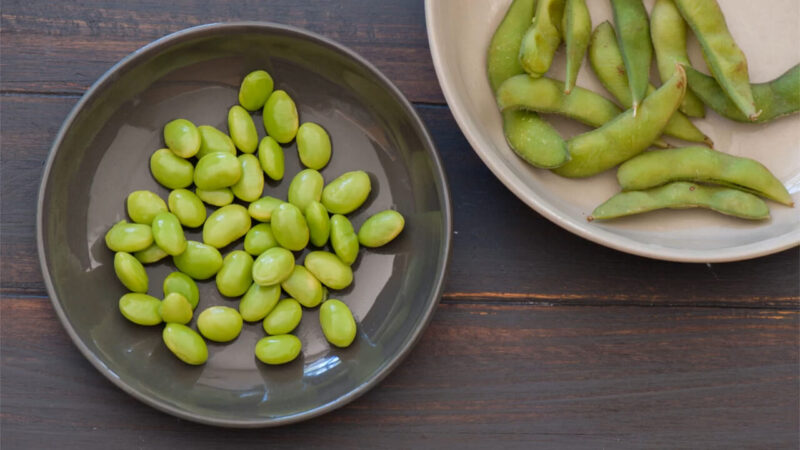
Edamame (young soybeans) are low in fat and high in protein, making them a healthy treat for active dogs. They also contain omega-3 fatty acids, which help reduce inflammation, improve heart health, and promote a healthy coat.
Edamame are also packed with fiber, supporting a healthy digestive system.
When feeding your dog beans, ensure they are fully cooked and offered in moderation. Avoid canned beans with added salt or preservatives. Beans can serve as a nutritious supplement, providing fiber for digestion, plant-based protein, and essential vitamins and minerals that contribute to overall health.
Preparation Tips:
- Cook Thoroughly: Ensure beans are well-cooked to improve digestibility and eliminate any harmful compounds.
- Avoid Additives: Do not add salt, sugar, spices, onions, or garlic.
- Serve in Moderation: Introduce beans gradually to monitor for any adverse reactions.
- Portion Control: Offer beans as an occasional treat rather than a staple in their diet.
Serving Suggestions:
- Plain Boiled Beans: Serve a small handful of plain, boiled beans as a snack.
- Mixed with Regular Food: Incorporate a few beans into your dog’s regular meal for added fiber and protein.
- Frozen Green Beans: A crunchy, low-calorie treat that many dogs enjoy.
Sign That Your Dog Is Poisoned With Beans
If your dog accidentally consumes baked beans, watch for the following signs of potential toxicity or adverse reactions:
Mild Symptoms:
- Gastrointestinal Upset: Vomiting, diarrhea, or gas.
- Increased Thirst and Urination: Due to high sodium content.
Severe Symptoms:
- Weakness and Lethargy: Signs of anemia from onion or garlic toxicity.
- Pale Gums: Indicating reduced red blood cell count.
- Rapid Breathing or Heart Rate: Possible signs of severe sodium poisoning.
- Collapse: In extreme cases, requiring immediate veterinary attention.
Immediate Actions:
- Contact Your Veterinarian: If you suspect your dog has ingested a significant amount of baked beans.
- Monitor Symptoms: Keep a close eye on your dog for any changes in behavior or health.
- Provide Fresh Water: To help mitigate the effects of high sodium intake.
If your dog drinks too much water during the day, read our blog on the topic.
If you notice that they consumed this product, make sure to watch over them in the next 24 hours, look for signs of toxicity, and take them to the vet.
You could also like I do, when my dog eats something that he shouldn’t, just give them a gallon of yogurt to drink, it is full of natural probiotics and it will cleanse them.
Conclusion
While baked beans are a flavorful and nutritious dish for humans, they are generally not recommended for dogs due to the presence of potentially harmful ingredients like onions, garlic, high sodium, and added sugars. Even homemade baked beans can pose risks if not prepared carefully. Instead, opt for safer, dog-friendly alternatives like plain green beans, carrots, or sweet potatoes to treat your canine companion.
Always prioritize your dog’s health by providing a balanced diet tailored to their specific nutritional needs. If you’re ever uncertain about whether a particular food is safe for your dog, consulting with your veterinarian is the best course of action. By making informed decisions, you can ensure that your dog remains happy, healthy, and well-fed.

